The First-Year Seminar
Hands shoot up around the table. In a cozy classroom on the second floor of the Peeler Art Center, assistant professor of film and media arts Jordan Sjol has just shown a curated series of video clips to illustrate the subtle differences between parody and pastiche. He now leans forward and listens as his students propel the discussion forward, many of them chiming in with thought-provoking questions and their own nuanced insights.
This is a typical Thursday afternoon in Sjol’s first-year seminar course on Western films and their role in American culture. Since class began over an hour ago, there have been no passive spectators. All 15 students are fully engaged, embracing the active role they play in the learning process. It’s an atmosphere that brims with curiosity and conversation, something that Briggs Gatterdam ’28 finds intellectually invigorating.
“I love the open discussion we’re able to have,” she says. “It’s really eye-opening to hear everyone’s individual perspectives. We’re facing each other, we’re talking, we’re sharing theories and ideas and spinning them off each other – that’s how I learn best.”
Sjol’s class is one of roughly three dozen first-year seminars taking place throughout campus every fall term. Although each one looks different from the next, these small, discussion-based classes all play a crucial role in bridging the gap between high school and college. Incoming students make their initial slate of course requests knowing that the centerpiece of their schedule will be one of these structured and supportive environments designed to acclimate them to the opportunities and demands of a DePauw education.
“What I want to do is make sure my students are prepared for the different modalities they’re going to experience here,” says Sjol. He maintains unapologetically high expectations for his students – especially when it comes to transferable skills like critical reading and exploratory writing – but the quality of the interactions in his classroom speak for themselves. “I’ve been very impressed with the ways that the students have risen to the challenges I’ve been setting for them.”
Jeff Kenney, senior professor of religious studies, has a similar outlook and similar expectations. He’s been teaching first-year seminars for several years, and he understands the challenge of transitioning to a demanding liberal arts environment. “The level of expectation has risen. The assignments and the readings are often more difficult. I think that’s what a first-year seminar is all about: getting up to speed and operating at a different level than high school. It takes time to sort all that stuff out.”
Through his seminar, titled 9/11 and the War on Terror, Kenney is helping his students make that leap. In addition to allowing his students to explore and debate the complex dynamics of national security and foreign policy, Kenney is ensuring they have a broad foundation to build upon as they progress in their studies.
“I design my seminar as a multidisciplinary course,” he explains. “I draw materials from communication, journalism, foreign affairs, international relations, political science, religious studies, sociology. The students are eventually going to be taking courses in these departments, so I see the first-year seminar as an introduction to the university, academically and intellectually.”
One of the students in Kenny’s class is Wyatt Brewster ’28. He currently plans to pursue a major in finance, and his seminar experience has given him a jumpstart he’s grateful for. “It’s like having a coach for your first semester,” he says. “Our professor has been there to help us adjust to the writing style and the rigor of our other classes.”
In many cases, that support extends beyond the classroom: each first-year seminar professor also serves as their students’ adviser until they declare a major. This aspect of the relationship often outlasts the seminar itself and creates additional opportunities for personalized guidance that helps students weather the personal, emotional and social challenges that accompany the transition to college life.
For students like Madison Ponsler ’28, these challenges can be daunting without someone there to help. “When I originally got here on campus, I underestimated how overwhelming so many things would be,” she admits. “I didn’t have anyone from my high school going to DePauw, I’d never lived away from home before, I’d never moved. So it was really eye-opening to navigate an entirely new world by myself.”
Ponsler’s experience isn’t unique. Christina Holmes, associate professor of women’s, gender, and sexuality studies, knows the feeling first-hand. She was a first-generation college student from a working class background, and she recalls how difficult it was to thrive without any context for understanding the college world. That’s why she’s proactive about providing mentorship to any student in her first-year seminar who can use a little support.
“I’m interested in the whole student,” Holmes says. “I explicitly tell folks, ‘I want to be your mentor.’ It’s a difficult transition for everyone, but especially if you don’t know the hidden rules and the language. What are the things that are going to be barriers for you not just when you show up in the classroom, but when you show up on campus and try to adjust to a new community?”
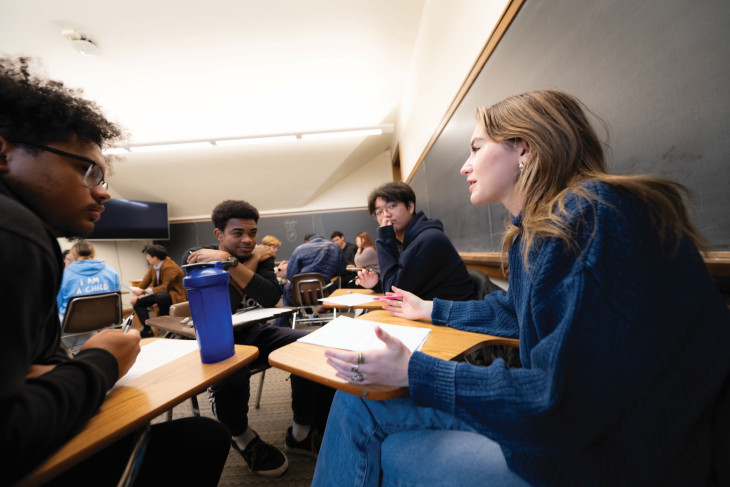
One of the most challenging barriers for many students is loneliness. Amid new surroundings and uncertain social dynamics, the first-year seminar provides an accessible entry point for students to build relationships with peers. Not only do the individual groups of first-year students share time together in the classroom, but they also connect regularly with an older student mentor who helps facilitate belonging and build social well-being.
Samantha Herrera ’28 explains, “I think my first-year seminar has made it easier for me to build a community within DePauw.” She’s found an unexpected academic interest in Holmes’s seminar, Building a Better World: Social Justice Praxis in America. But she’s also found new friendships in the process. “Whether it’s having breakfast with some of the other people in this class or just walking together to class, it’s been nice getting to know them and who they are as people.”
Meanwhile, in Jordan Sjol’s seminar, Mya Adams ’28 has experienced something similar with her classmates. “We all play different sports, we all have different majors, we’re all in different social circles. But since that first day of orientation, this is the group we’ve been with. It’s not that we’re all best friends, but we know we can count on each other.”
The strength of these relationships isn’t just socially advantageous. It also makes it possible for students to tackle tough conversations in class while maintaining civility and a deep mutual respect for one another. Several first-year seminars are even intentionally focused on cultivating this skill as a part of DePauw’s larger efforts to champion free expression throughout campus.
“From the very first day, we want to humanize everyone and hear about how our backgrounds inform our perspectives and how we can build common ground,” says Holmes. Because she frequently addresses sensitive and potentially controversial topics in her seminar, she proactively ensures it is an environment in which everyone’s voice can be heard. “The students bring their own knowledge to the classroom,” she says, “and we all benefit when we can share it.”
For Town Oh, assistant professor of economics and management, this is what makes the college experience so unique. He recently received a fellowship from Duke University that has allowed him to collaborate with scholars around the nation in exploring how to foster campus cultures where students and faculty can freely discourse with each other. A tangible byproduct of that exploration is his first-year seminar, Bold Conversations in an Age of Polarization.
“I think the university should be the place where you get rid of as many barriers as possible for the free exchange of ideas to happen,” Oh says. Students in his class research and discuss delicate topics such as theism, abortion and climate change – topics about which many students already have strong and deeply held beliefs. The key, however, is to share those beliefs while upholding a nonnegotiable commitment to listening and learning from other perspectives.
Oh emphasizes three principles that guide his students in having productive conversations: freedom, humility and charity. He believes each principle is critical in helping students move past the hostility that hampers so much public discourse. “They have to be curious about the other side,” he says. “What they know on a topic is only a fraction of what there is to know. So let’s have a discussion, let’s find out more.”
Walker Lasbury ’28 has found this approach to be highly productive, even when he and his classmates don’t end up agreeing with one another at the end of a discussion. He’s even been inspired to apply it outside of class. “This seminar has definitely encouraged me to push the boundaries a bit, to explore other people’s opinions, to have respectful conversations. Some people have even been surprised. It’s not normal for someone to reach across the aisle.”
At DePauw, however, first-year seminars like Oh’s are doing their part to make it normal. It’s all part of the process of preparing students to become well-rounded leaders who thrive in any setting where they might end up.
“Ultimately I want these students to be prepared for the real world,” says Oh. “And in the real world, they’re going to be interacting with people that are vastly different from them.”
Back in the classroom at Peeler, the clock finally forces Jordan Sjol to bring the day’s lively discussion to a close. As class wraps up and student conversations spill out into the hallway, Mya Adams knows that what she’s been experiencing in this seminar will have a positive and long-lasting impact.
“This class has forced me to demand the absolute best out of myself,” she says. “It’s definitely helped shape the beginning of my DePauw experience.”
DePauw Magazine
Spring 2025
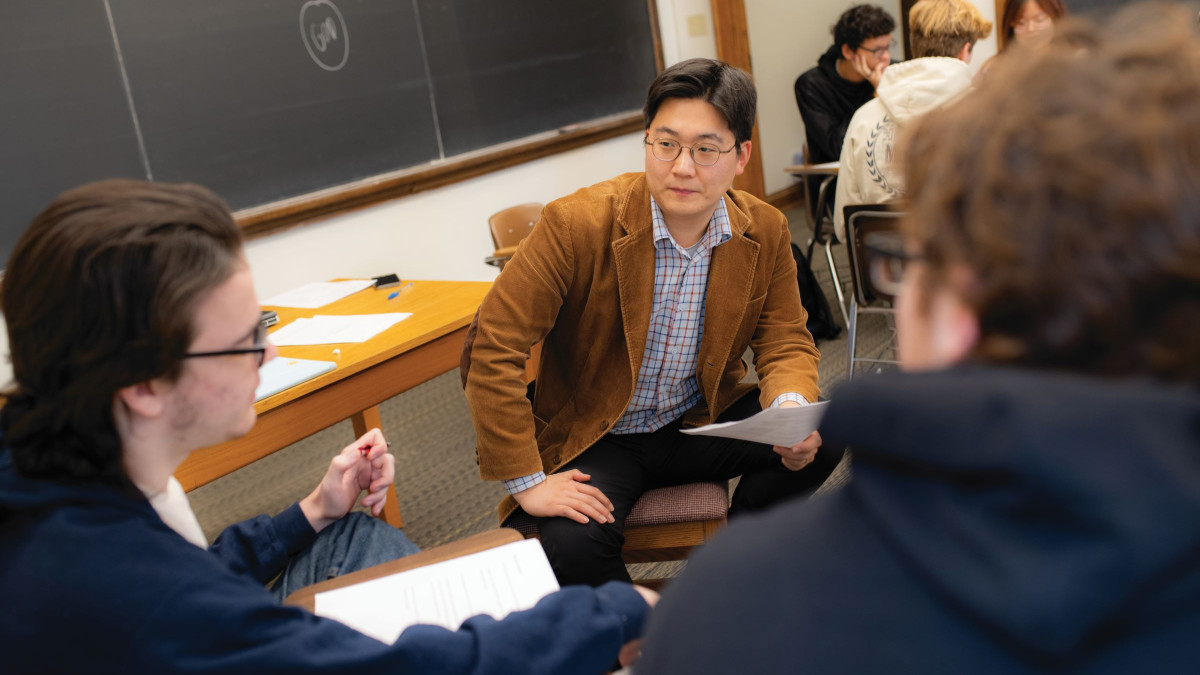 The First-Year Seminar
The First-Year Seminar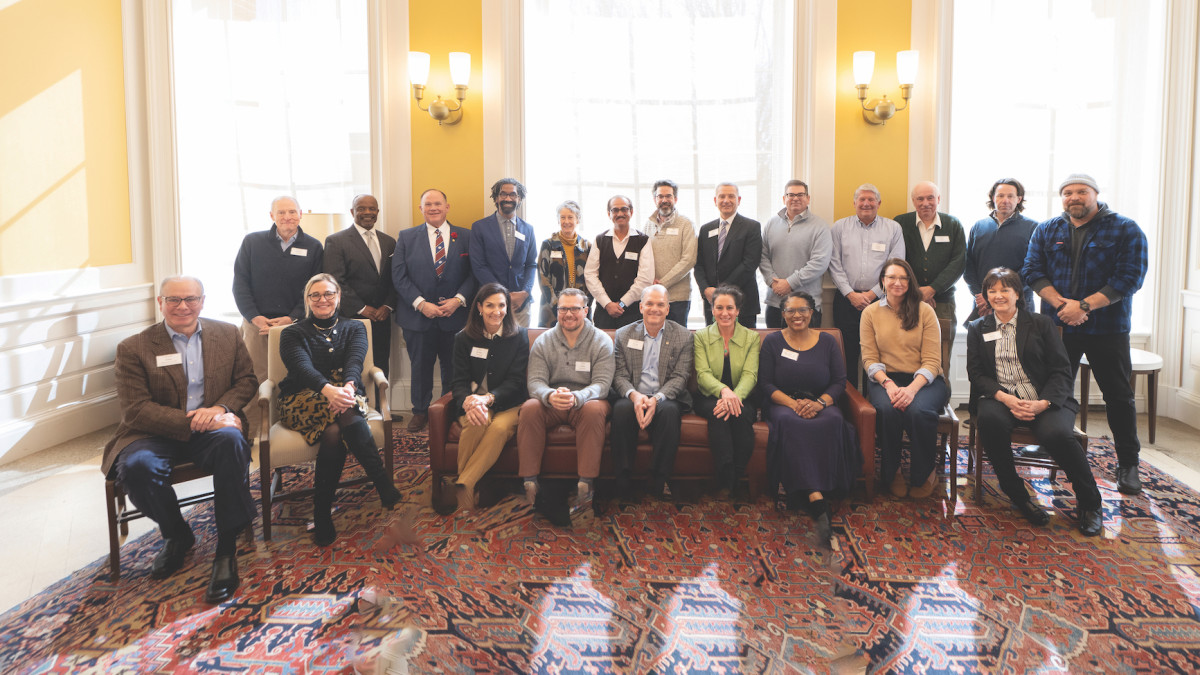 Trusted Advisers
Trusted Advisers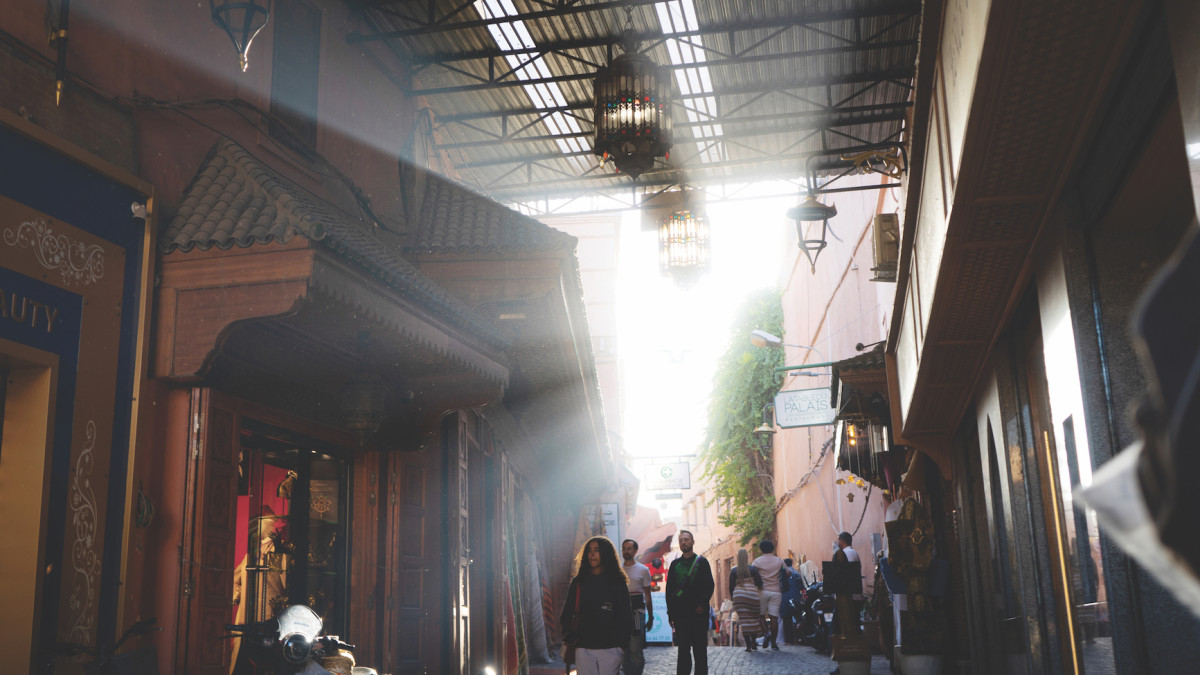 Winter Term in Full Color
Winter Term in Full Color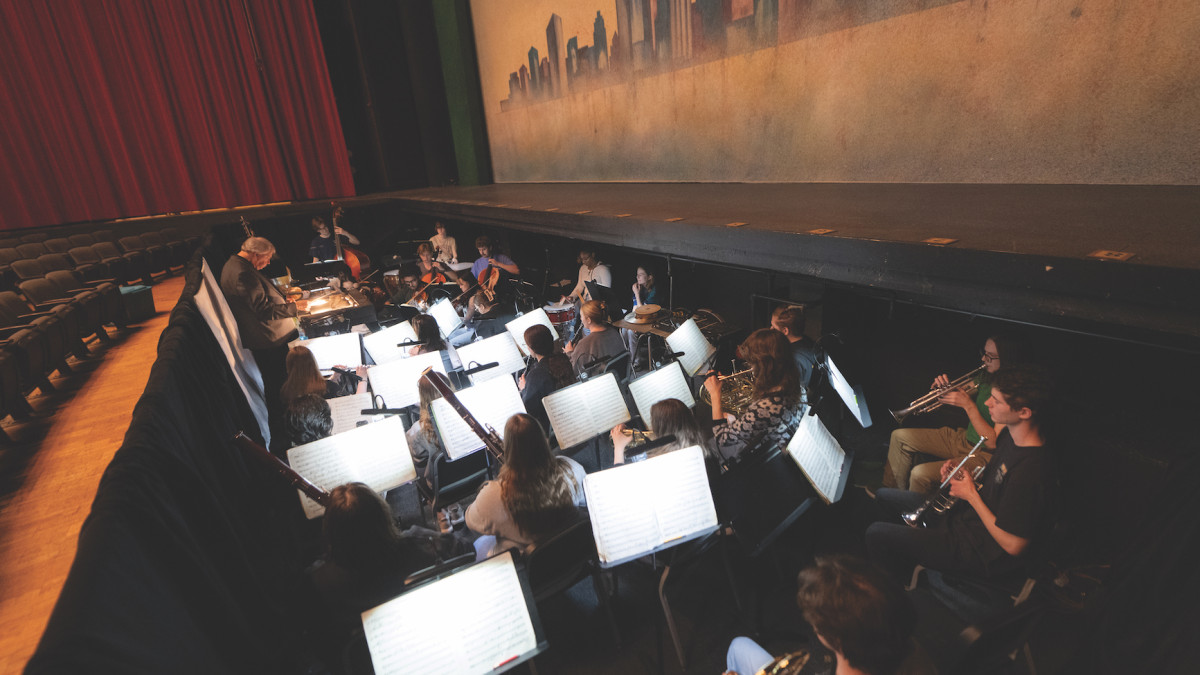 Institute of Music
Institute of Music
DePauw Stories
A GATHERING PLACE FOR STORYTELLING ABOUT DEPAUW UNIVERSITY
Browse other stories
-
Athletics
-
Men's Basketball - Tigers Move to 3-0 in NCAC with a 77-65 Win over Wooster
-
Football - Robby Ballentine Chosen AFCA Second Team All-America
-
Football - 10 Tigers Earn D3football.com All-Region Honors
More Athletics
-
-
News
-
Four in a Row! DePauw Wins 131st Monon Bell Classic
-
Jim Rechtin '93 Featured in Fortune Magazine
-
DePauw Football Standout Named Campbell Trophy Finalist
More News
-
-
People & Profiles
-
Entrepreneurs Eric Fruth ’02 and Matt DeLeon ’02 Are Running More Than a Business
-
Rick Provine Leaves Legacy of Leadership and Creativity
-
History Graduate Cecilia Slane Featured in AHA's Perspectives on History
More People & Profiles
-
-
Have a story idea?
Whether we are writing about the intellectual challenge of our classrooms, a campus life that builds leadership, incredible faculty achievements or the seemingly endless stories of alumni success, we think DePauw has some fun stories to tell.
-
Communications & Marketing
101 E. Seminary St.
Greencastle, IN, 46135-0037
communicate@depauw.eduNews and Media
-
News media: For help with a story, contact:
Bob Weaver, Senior Director of Communications.
bobweaver@depauw.edu.